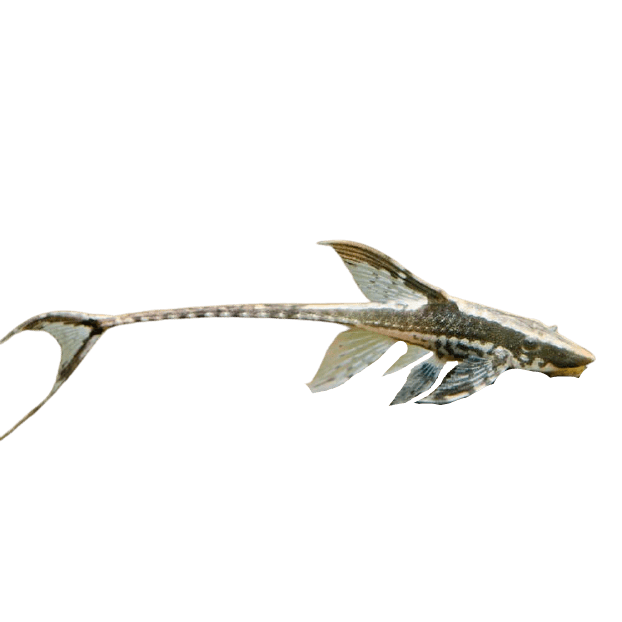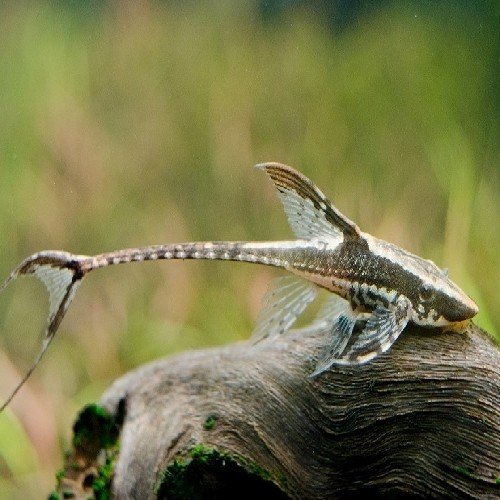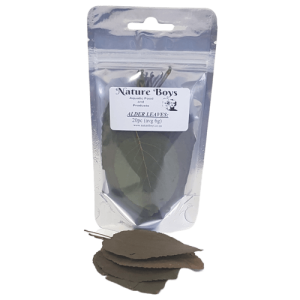Whiptail Catfish
R250.00
Before ordering live fish, please click to check if we can safely ship livestock to your location.
Please note that fish image is a representation of what the fish might look like as an adult.
Whiptail Catfish originate from the Paraguay River Basins of South America and are probably the most underrated catfishes in the hobby. They combine bizarre looks with hardiness, adaptability, and utterly peaceful temperaments. While generally they are carnivores rather than algae-eaters, their predatory instincts are directed toward worms and insect larvae, and whiptails won’t harm even the smallest tankmates, such as livebearer fry. They play nice with other fish and have an interesting, angular appearance to their bodies. However, they aren’t as popular as their pleco cousins, possibly because they do not have that same reputation for eating algae. In the right tank, a whiptail can make a nice point of interest.
Behavior
A good scavenger but not a good algae-eater. One of the bigger challenges with Whiptails is they are slow feeders and easy targets for nippy or aggressive fish.
Tank Conditions
Whiptail catfish can be kept singly, in a pair or in groups. A pair can share a 75 litre aquarium. When keeping more than a pair, add 40 litres to the minimum aquarium size per additional fish. Whiptails spend a lot of time on the bottom of the aquarium, so use a soft, sandy substrate instead of rocks. Whiptail catfish need lots of hiding places to feel safe, so a tank should have lots of plants and driftwood for them to hide in. They also prefer water on the cool end of tropical fish. Substrate is an issue, though, given that these whiptails forage in open water rather than among rocks or plants. What they really enjoy is a sandy substrate, such as the kinds of smooth silica sand, or anything smooth so it won’t damage burrowing fish.
While you could use Indian almond Terminalia catappa leaves to create authentic-looking leaf litter, low-lying plants such as Cryptocoryne and dwarf lilies are just as useful and last much longer. Your whiptails won’t care, provided there are lots of open areas between individual clumps of plants.
Most whiptail catfish require highly oxygenated water and prefer a hefty current. Provide them with hiding places in the form of pvc piping, this will give them the opportunity to hide away in the daytime and become more active after lights out.
Compatibility
Compatible with docile species such as Tetras, Pencil fish, Hatchets and Danios (they prefer cooler water temp also). They are vulnerable to attacks from Bards and Cichlids. Generally, whiptail catfish get along well with any fish that won’t bother them. Their mouths are too small to be very predatory. However, any aggressive or nippy fish will find an easy target in a whiptail catfish, so consider tank mates carefully. Also, try for fish that enjoy the same kind of aquarium conditions. Fish that prefer a higher temperature or pH belong in a different tank. A few Corydoras catfish shouldn’t cause any serious problems in a community tank large enough for everyone to find something to eat, but bigger, pushier bottom-feeders such as loaches and common plecos are not good companions for whiptails. Whiptails can make good companions for gouramis and the more peaceful dwarf cichlids, but they’re easily damaged if such fish become aggressive.
Feeding
This fish will eat most species of algae but its diet will need to be supplemented. Despite their resemblance to plecos, whiptail catfish are not good algae-eaters. They are omnivores, leaning toward carnivores. So use sinking pellets designed to sink to the bottom of your tank. You can feed live or frozen fish foods like brine shrimp or bloodworms as an occasional treat but make sure they make it to the bottom of your tank. Whiptails really do need some green algae in their diet, and that means they are best kept in a mature, spacious, and brightly lit aquarium that allows them to forage naturally. Algae wafers, Spirulina flake, sliced zucchini, and cooked spinach are also good foods.
Care
As typical of all catfish, Whiptails cannot tolerate salt or brackish water but they are not picky about their aquarium conditions. Little maintenance has to be done to keep them in good condition. Regular siphoning of the gravel is recommended to remove waste and keep the tank in a clean state. The recommended water change is 10 – 15% every other week to keep up with the bio-load. High nitrate levels can cause catfish to develop infected barbels; this makes it difficult for them to navigate and eat normally. It is recommended to maintain nitrate levels below 20 ppm.
Because they are a scaleless fish, catfish can be treated with API Pimafix or API Melafix but should not be treated with potassium permanganate or copper based medications. Malachite green or Seachem ParaGuard can be used at one half to one fourth the recommended dosage. All medications should be used with caution.
Click for Fish Disease Diagnosis and Treatment at Rebel Pets.
| Category | Rating |
|---|---|
| Adult Size: | 10 cm |
| Aquarist Experience Level: | Beginner – Intermediate |
| Minimum Tank Size: | 50 litres |
| Temperament: | Peaceful, good community fish |
| Tank Level: | Bottom dweller |
| Diet: | Omnivore/Carnivore |
| Aquarium Hardiness: | Hardy |
| Lifespan: | 5 – 8 Years |
| Water Flow: | Moderate to High |
| Temperature: | 20 to 26°C |
| pH: | 6.0 – 8.0 |
| Hardness: | 5 – 17° dGH (moderately soft) |
Shipping Countries: South Africa
Shipping States: Gauteng (South Africa)
Specification: Whiptail Catfish
| Weight | 0.25 kg |
|---|

Ultrazap Pond Combibox 1 (8-12000L pond) 15W
Product Enquiry

R250.00



















There are no reviews yet.